The 2020 Mac Mini Unleashed: Putting Apple Silicon M1 To The Test
by Andrei Frumusanu on November 17, 2020 9:00 AM ESTBenchmarks: Whatever Is Available
As we’ve had very little time with the Mac mini, and the fact that this not only is a macOS system, but a new Arm64-based macOS system, our usual benchmark choices that we tend to use aren’t really available to us. We’ve made due with a assortment of available tests at the time of the launch to give us a rough idea of the performance:
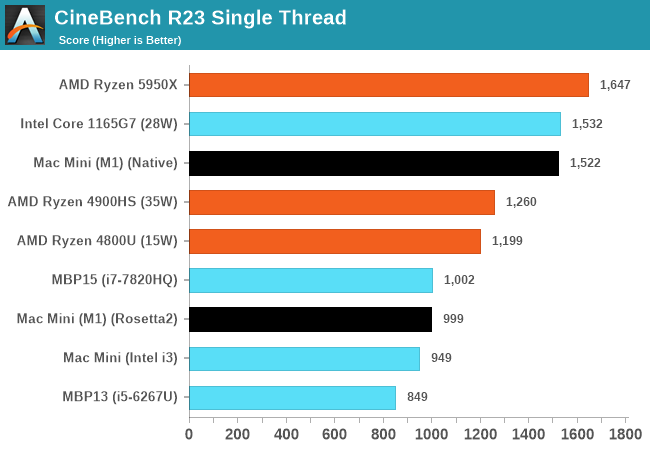
One particular benchmark that sees the first light of day on macOS as well as Apple Silicon is Cinebench. In this first-time view of the popular Cinema4D based benchmark, we see the Apple M1 toe-to-toe with the best-performing x86 CPUs on the market, vastly outperforming past Apple iterations of Intel silicon. The M1 here loses out to Zen3 and Tiger Lake CPUs, which still seem to have an advantage, although we’re not sure of the microarchitectural characteristics of the new benchmark.
What’s notable is the performance of the Rosetta2 run of the benchmark when in x86 mode, which is not only able to keep up with past Mac iterations but still also beat them.
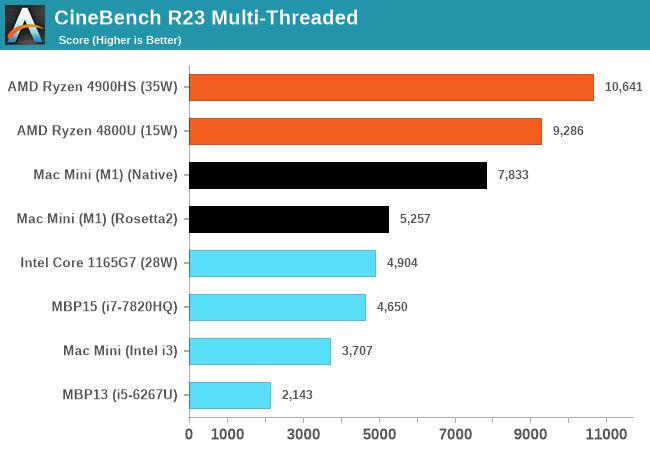
In the multi-threaded R23 runs, the M1 absolutely dominates past Macs with similar low-power CPUs. Just as of note, we’re trying to gather more data on other systems as we have access to them, and expand the graph in further updates of the article past publishing.
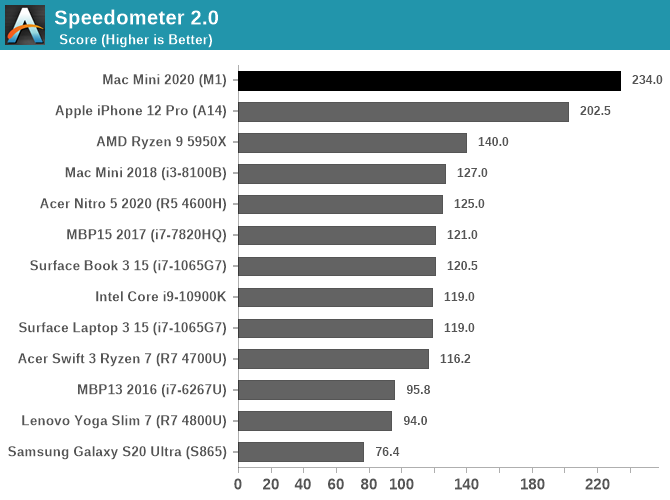
In browser-benchmarks we’ve known Apple’s CPUs to very much dominate across the landscape, but there were doubts as to whether this was due to the CPUs themselves in the iPhone or rather just the browsers and browser engines. Now running on macOS and desktop Safari, being able to compare data to other Intel Mac systems, we can come to the conclusion that the performance advantage is due to Apple’s CPU designs.
Web-browsing performance seems to be an extremely high priority for Apple’s CPU, and this makes sense as it’s the killer workload for mobile SoCs and the workload that one uses the most in everyday life.
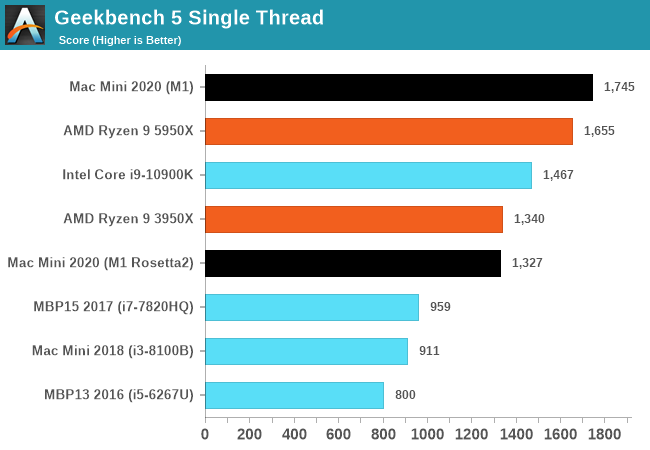
In Geekbench 5, the M1 does again extremely well as it actually takes the lead in our performance figures. Even when running in x86 compatibility mode, the M1 is able to match the top single-threaded performance of last generation’s high-end CPUs, and vastly exceed that of past iterations of the Mac mini and past Macbooks.
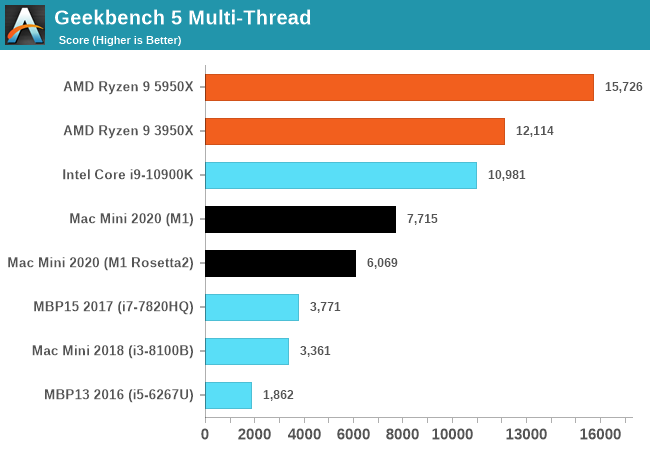
Multi-threaded performance is a matter of core-count and power efficiency of a design. The M1 here demolishes a 2017 15-inch Macbook Pro with an Intel i7-7820HQ with 4 cores and 8 threads, posting over double the score. We’ll be adding more data-points as we collect them.


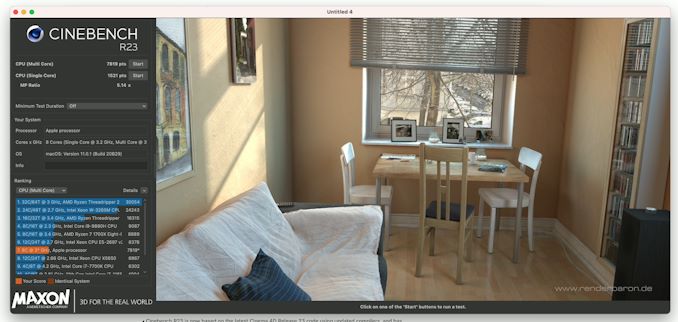








682 Comments
View All Comments
Alistair - Thursday, November 19, 2020 - link
Yeah I don't want any more CPU cores, I want clock speed increases. I also want double the GPU. M1G with double the GPU, make it happen Apple.ChrisGX - Thursday, November 19, 2020 - link
Long ago, I was in the computer trade, for a time. People, from time to time, still ask me about product purchases and issues of the moment shaping computing products for consumers. From the information already available on the M1 I can say that, at this point, it won't be hard to recommend the MacBook Air (and MacBooks and Mac Minis more generally) to anyone who wants to know what I think. I would mention all the standard caveats, of course. The Apple bear hug is not for everyone but it is hard to miss the fact that Apple is now making better consumer computers than its competitors and, for the first time from any computer products supplier, Apple's computers for average users rate very well on both performance and energy efficiency.As far as I am concerned the Tiger in Tiger Lake turned out to be toothless. Meanwhile AMD has been stung but can't be counted out. If anyone wants to get a computer less expensive than a MacBook Air I would advise and ARM based Chromebook or Tablet.
nicball - Thursday, November 19, 2020 - link
Is it true that the SPEC scores are run in WSL for Windows machines? Then it only makes sense if you compare them among Windows machines, not across OSes.ChrisGX - Thursday, November 19, 2020 - link
Is it true? Hmm...NO!SPEC isn't a secret cabal. You can look this stuff up on their website. Try here:
https://www.spec.org/cpu2017/Docs/system-requireme...
https://www.spec.org/cpu2017/Docs/install-guide-wi...
https://www.spec.org/cpu2017/Docs/
https://www.spec.org/cpu2006/Docs/system-requireme...
https://www.spec.org/cpu2006/Docs/install-guide-wi...
https://www.spec.org/cpu2006/Docs/
substance90 - Thursday, November 19, 2020 - link
The denial of AMD fanboys is so strong.. I can't resist getting the popcorn out.Spunjji - Thursday, November 19, 2020 - link
Yeah, I've been disappointed to see a few familiar names howling with rage at this one.That said, the Intel shills are clearly here too - just under new aliases, as seems to be customary.
vaddieg - Thursday, November 19, 2020 - link
Andrei, why haven't you used 'sudo powermetrics' for chip power introspection? AC Wall measurement doesn't seem to be very accurateSpunjji - Thursday, November 19, 2020 - link
I'd like to see that, too.ricebunny - Thursday, November 19, 2020 - link
Anandtech please clarify which compilers and platforms you are using. I do hope you are using the Intel compiler for Intel chips?The same Tiger Lake chip scored 20% less in this review than it did 2 months ago. This destroys the credibility of your results.
Spunjji - Thursday, November 19, 2020 - link
Only in the SPEC 2017 benches, which they explicitly noted aren't running with the full suite...